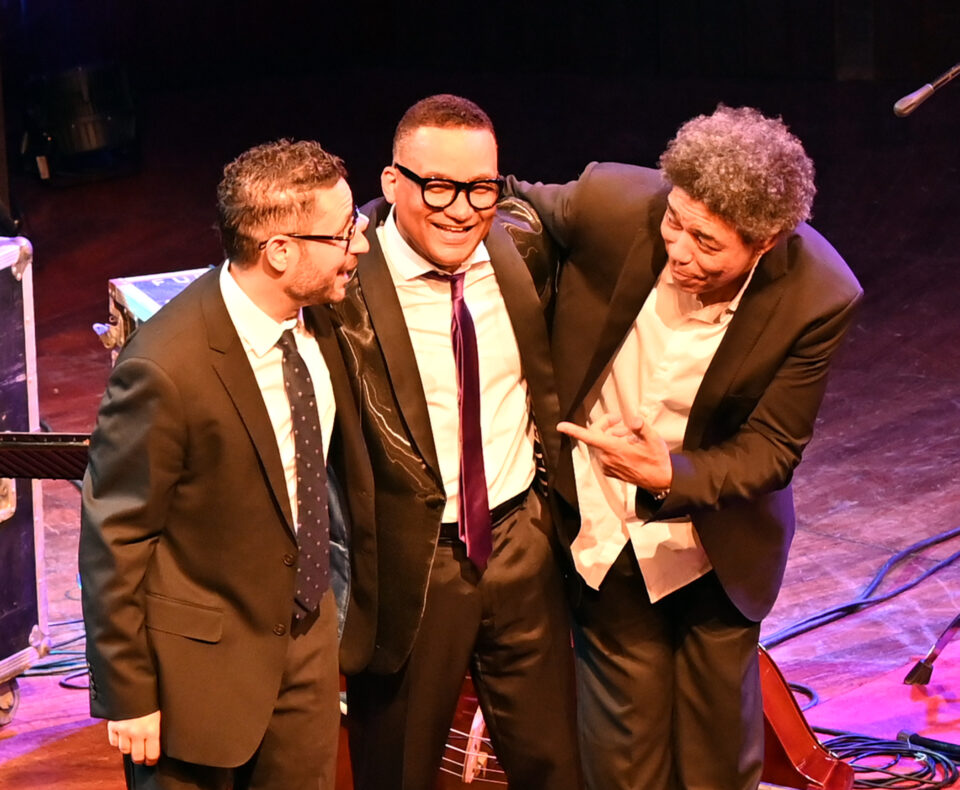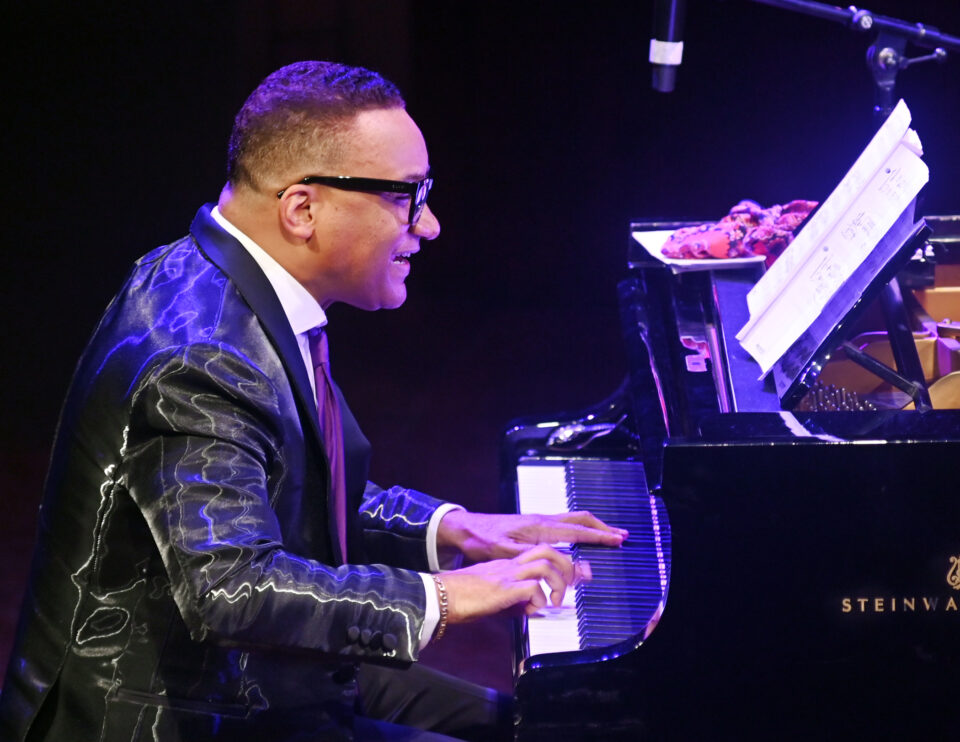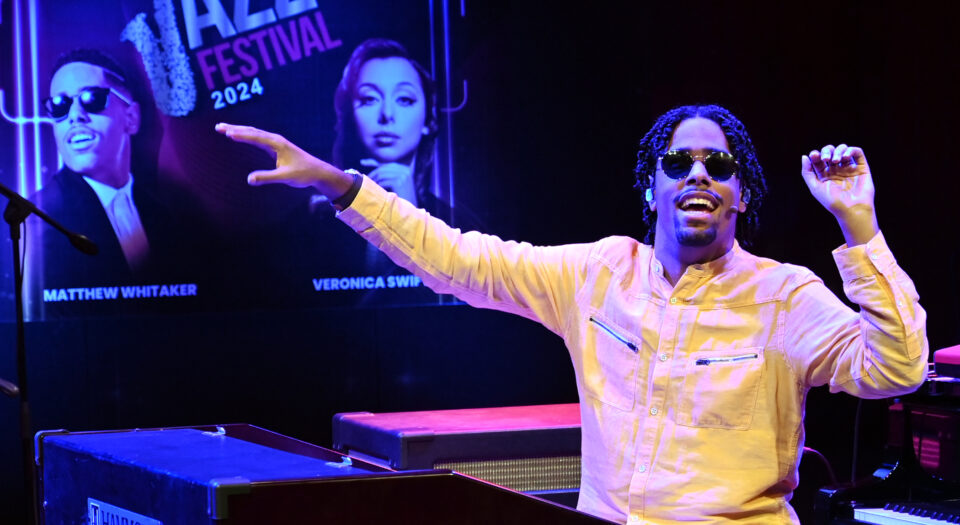Review: NCPA Jazz Festival 2024 Brought Tributes and More
The three-day edition rolled into Mumbai on Nov. 22, 23 and 24, running continuously since the first one was held in 2011

Gonzalo Rubalcaba performs at the NCPA International Jazz Festival with Ricardo Figueroa on Bass and Ernesto Simpson on drums, an NCPA Presentation, at the Tata Theatre, NCPA, Nariman Point, Mumbai, on November 23, 2024. Photo: Narendra Dangiya/NCPA
The Steinway grand piano at the Tata Theatre, where the NCPA Jazz Festival festival was held, was central to the three-day event in many ways. Three piano-featured sessions saw a trio of totally contrasting approaches to the instrument, emphasizing the depth and versatility of this beautiful art form — jazz. A fourth concert also featured the piano but in a very minor, support role to the vocalist Veronica Swift.
Brandon Goldberg, a New York-based 18-year-old pianist opened the festival. It was a nice sight to see that each member of the band was dressed in a grey business suit. Appearance is important and it makes an impression even before the first note is struck.
Their approach to the music was certainly disciplined as they went through a well-rehearsed set. The quartet comprised Vincent DuPont on upright bass, Adam Stein on tenor saxophone, Jimmy MacBride on drums, and of course Brandon Goldberg on piano.
The band sound was pleasant and it was good to see a current generation of musicians paying musical tribute to the elders of the jazz tradition. Starting with a Ron Carter composition, they played John Coltrane’s “Straight Street,” Miles Davis’ “Serpent’s Tooth,” and Bud Powell’s “Hallucination.” Goldberg said to us later that Bud Powell is his favorite pianist. The band also played a couple of originals, “July 31” and a trio version of “Meditations in E Flat.” For us, the best part of the session was the solo piano version of “Someone to Watch Over Me,” an apt tribute to the composer George Gershwin.
The supporting musicians supported Goldberg nicely and kept the music lively throughout. It was a pleasing concert from a young pianist who will only get better as the years go by.
Day two saw the NCPA Steinway in the hands of Gonzalo Rubalcaba, a masterful pianist from Havana, Cuba and now a resident of Miami, Florida. His trio comprised of Rick Ricardo on upright acoustic bass and Ernesto Simpson on drums.
Rubalcaba is a frighteningly accomplished jazz pianist and played perhaps one of the most scintillating jazz concerts heard in Mumbai in recent years. Although short on announcing the tunes they were performing, Rubalcaba and his trio played as if by telepathy, reading and anticipating each other’s playing; the trio played not just notes, but musical textures as if by extensive rehearsal. In reality, it transpired that they had never played together as a trio and that they prepared for the NCPA concert only at soundcheck, a couple of hours before they faced the audience! To us, it seemed that the three musicians were having lyrical, musical conversations with each other which were so communicative that a fourth musician with the group might have been an intrusion.

Two of the tunes they played were jazz standards, “Caravan” and “Autumn Leaves,” which had the audience in raptures. We recognized a third offering as being Bill Evans’ “Gloria’s Steps,” a relatively obscure jazz composition. The trio’s alchemy remained in the other tunes they played.
For an encore, Rubalcaba played an exquisite unaccompanied solo piano piece which left nobody in doubt of his classical training on the piano. Ernesto Simpson on the drums was understated to a level of sophistication while Ricky Ricardo, a Puerto Rican by origin, was eloquence personified on the upright acoustic bass. It was a jaw-dropping jazz performance from this trio.
The Matthew Whitaker Quintet used the Steinway in an entirely different way! The versatile Whitaker played not just the acoustic piano but also the Hammond organ and the electronic keyboards through his set. His music instantly resonated with the audience with the honest, extroverted playing of blues=based tunes. It is said that “nothing satisfies like the blues” and the music played by this band was certainly from the blues cabinet, modified and bottled into a modern idiom, much like the sounds of Ray Charles and Stevie Wonder; in fact, Whitaker has once shared a concert stage with Stevie Wonder.
They entertained us with a varied offering and various group combinations. Jimmy Smith’s famous “Organ Grinder’s Swing” was played with equal gusto by Whitaker on the Hammond with guitar and drums forming the trio. The bossa nova standard, “Mas Que Nada” opened quite sensationally with a seven-minute percussion solo from Ivan Llanes which lit up the crowd. The rendition was something straight out of the Carnival in Rio de Janeiro.
“Harlem, Harlem, Harlem” was an uptempo tune played by the band and was reminiscent of Nat Adderley’s “Work Song.” A strong social message in “Stop Fighting” and “Expect your Miracle” were both handled with sensitivity.
However, Louis Armstrong’s endearing, “What a Wonderful World” played by Whitaker accompanying himself on solo piano was a highlight in this set. Whitaker in his most entertaining set brought out the essence of African American music.

The Lords of Jazz are very tolerant, broad-minded and accommodating of fringe musical sounds pitching their tents in their territory. Jazz has a broad, almost nebulous definition, after all. Vocalist Veronica Swift played the concluding set at this jazz festival. One had to stretch one’s imagination considerably to recognize her set as belonging to the jazz genre. Swift has been known to have performed jazz, but being versatile, she also sings in other modes. Here, part Madonna, part Freddie Mercury, she certainly was very lively on stage in her black and gold leotards. Her band members were also dressed in black and gold outfits and the visual effect on stage was compelling. The energy levels of performance were high but the Steinway was, musically, in the background.
She paid tribute in one song to Bessie Smith and to Janis Joplin and Jimi Hendrix in another; both performed in rock rather than jazz style. It was enjoyed by some in the audience.
In all, this was a fine, diverse jazz festival which seemed to satisfy the cross-section of those who attended and in keeping with the benchmark for jazz performance set by this festival.



